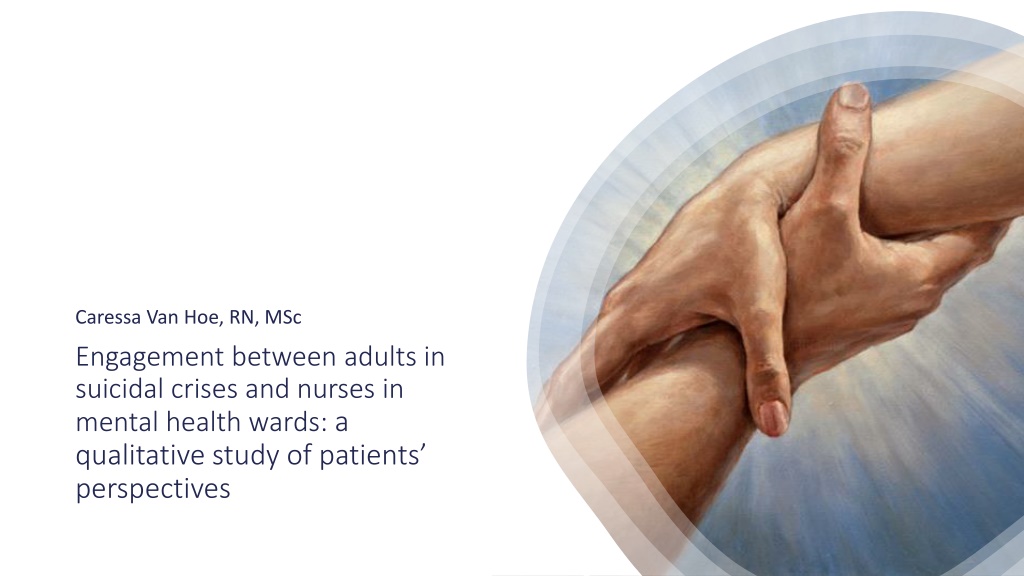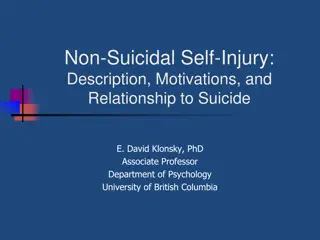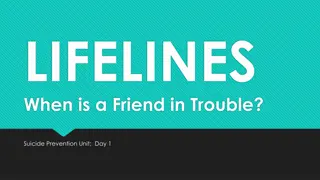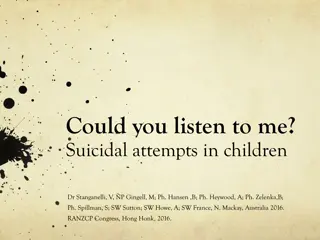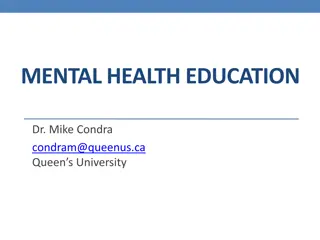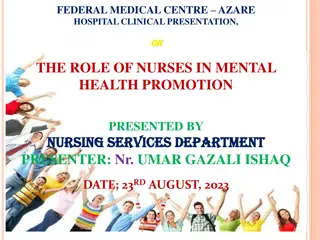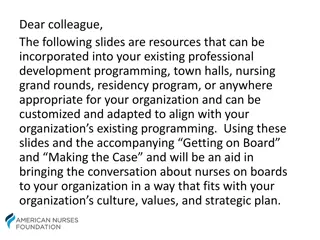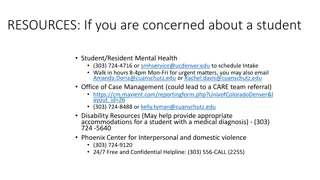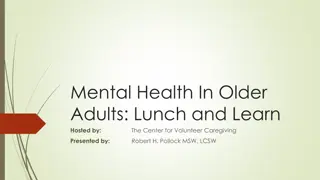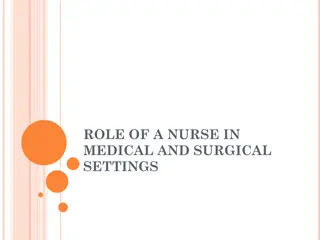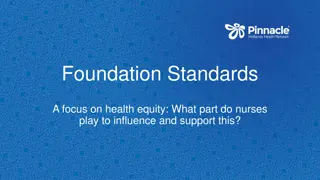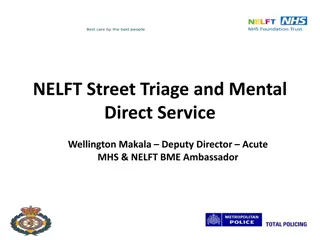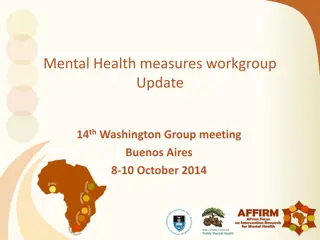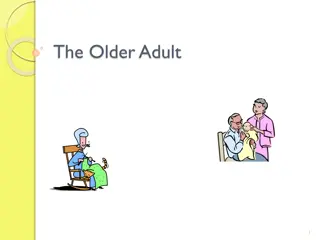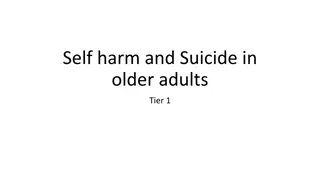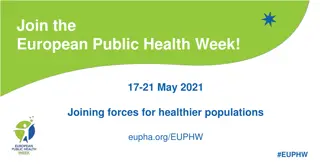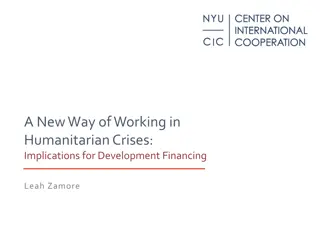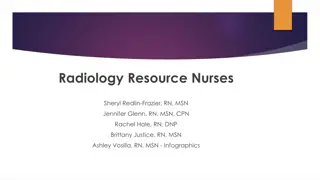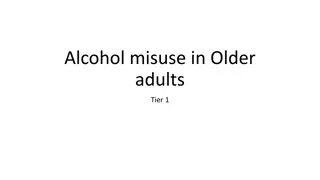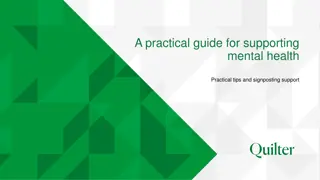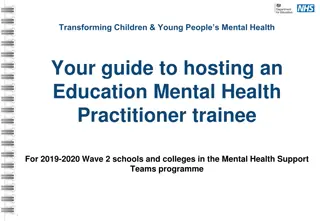Perspectives on Engagement between Adults in Suicidal Crises and Mental Health Nurses
Patients in suicidal crises perceive their interactions with mental health nurses as crucial for feeling nurtured, safe, and supported. The study explores how compassionate engagement aids in alleviating suicidal ideation and fostering trust, emphasizing the significance of interpersonal relationships in mental health care.
- Mental Health
- Suicide Prevention
- Nurse-Patient Interaction
- Patient Perspectives
- Interpersonal Engagement
Download Presentation

Please find below an Image/Link to download the presentation.
The content on the website is provided AS IS for your information and personal use only. It may not be sold, licensed, or shared on other websites without obtaining consent from the author. Download presentation by click this link. If you encounter any issues during the download, it is possible that the publisher has removed the file from their server.
E N D
Presentation Transcript
Caressa Van Hoe, RN, MSc Engagement between adults in suicidal crises and nurses in mental health wards: a qualitative study of patients perspectives
CONTENT Introduction Methodology Findings Discussion Conclusion
INTRODUCTION INTRODUCTION Cornerstone of care is the interpersonal relationship between a patient and a health care professional Forming human connections, talking about suicide, conveying empathic understanding, supporting coping strategies Inspire hope, nurture recovery, foster effective suicide risk assessments and collaborative preventive and psychotherapeutic interventions However: overly medical and risk-averse cultures and reduced attention to interpersonal engagement Role of mental health nurses? Interpersonal and caring processes are under pressure
METHODOLOGY METHODOLOGY Objective: To understand how patients in suicidal crises perceive their engagement with nurses in mental health hospitals Design: A qualitative interview study based on grounded theory Participants: 11 pp recruited from six wards in three mental health hospitals; between 18-65y, Dutch, admitted to mental health hospital; suicidal crisis in the past year Data collection: Semi-structured interviews from September 2019 March 2020 Data analysis: Multiple researchers, using the constant comparison method, coding, and memo writing
FINDINGS FINDINGS How do patients in suicidal crisis experience their interactions with mental health nurses? Feeling nurtured through an interpersonal engagement Feeling safe and cared for while struggling to trust (care) Working toward alleviation and change of my suicidal ideation (heal)
Feeling safe Feeling safe and and cared cared for for while while struggling struggling to to trust trust 01 02 Encountering compassion and genuine involvement Regaining stability and security amidst the chaos I experience
1. 1. Encountering Encountering compassion involvement involvement Experiences of shame and being misunderstood, feeling unsafe and worthless Encounters of genuine involvement and compassion: converse as individuals; taking the time to listen; demonstrating concern; non-judgemental; initiating contact; respect; to acknowledge and support them in bearing their suffering Cautious steps toward building trust: to be worth investing in and accepted for who they are Impersonal encounters: feeling unsafe; difficulties in connecting, building trust, seeking help compassion and and genuine genuine
1. 1. Encountering Encountering compassion involvement involvement compassion and and genuine genuine I had not been to therapy. She [the nurse] was so concerned about me it felt warm and genuine. This was evident by her expressions and the tone of her voice. It was as if she really missed me and believed that I am important. (woman, 26-35y) It is very difficult for me to trust someone and then I felt like I was being attacked while talking to the nurses. I just started to express myself a little bit and they were like predators waiting for me to give them something to jump on. (woman, 36-45y)
2. 2. Regaining Regaining stability chaos I chaos I experience experience stability and and security security amidst amidst the the State of chaos, insecurity, loss of control need for regaining stability and security Consistent nursing care and support (available, regular contacts, well-informed) understaffing and nurse turnover (feeling alone in their suffering) A nurse who represent stability and security, being trustworthy, Mixed feelings about safety routines
2. 2. Regaining Regaining stability chaos I chaos I experience experience stability and and security security amidst amidst the the For a while there were hardly any nurses, because of vacations. Then, I started to wonder if the mental hospital was the right place. I really need that stability when I fall into chaos. I feel secure when the environment makes me feel safe; this gives me reassurance and confidence to work on myself. (woman, < 25y) If an agreement is made, such as I will contact you again today , the nurse must not say: Well, I intended to see you, but I completely forgot . Then I unimportant to be considered. (woman, 26-35y) feel misunderstood and too
Working Working toward suicidal suicidal ideation ideation toward alleviation alleviation and and change of change of my my 01 02 Being express myself and my suicidal ideation enabled to Being working suicidal crisis assisted through in my
1. 1. Being Being enabled suicidal suicidal ideation ideation enabled to to express express myself myself and and my my Feeling vulnerable to express themselves, having limited words a nurse who reaches out, recognises and responds to subtle communications; who shows concern and understanding Nurses initiating conversations about SI: feeling accepted and understood, also exhausting Nurses avoiding conversations or being startled by suicidal expressions: sense of alienation Nurses questioning them without acknowledging their feelings: distress and insecurity, aversion to conversations impedes trust in nurses, stuck in suffering, tendency to not disclose any further
1. 1. Being Being enabled suicidal suicidal ideation ideation enabled to to express express myself myself and and my my I had a connection with her and she invited me: Let s have a conversation, because I see youare struggling . Then I was able to freely express my thoughts. If she had not noticed mysituation at that moment, I am convinced that I would have attempted suicide. (man, 36-45y) I informed that nurse about my suicidal thoughts and she was completely shocked. I did not dare to talk about it anymore. I felt alienated and did not want to burden her. But with him I was surprised that he did not have this reaction. I can trust him to share my thoughts, because I know he can work with me through it. (woman, < 25y)
2. 2. Being Being assisted suicidal suicidal crisis crisis assisted in in working working through through my my Developing alternative perspectives Positive encouragement: expressing belief in them, validating their efforts to get better, helping them become aware of positive signs Personal capacities and resources: to identify and reflect on suicidal ideations; expand awareness of their crisis; organise and clarify thoughts and feelings) turn chaos into more coherent experiences, co-constructing a crisis response plan Lacking an orientation or capacity to work through their SC (instant solutions, imposing therapeutic regimes) or showing compassion without challenging their SI
2. 2. Being Being assisted suicidal suicidal crisis crisis assisted in in working working through through my my They seem to understand my situation and want to collaborate with me to work through it. They truly investigate where my suicidal thoughts come from; they ask me to explain why I see it this way and why I have these thoughts. (man, 26-35y) I said to the nurse: I feel unwell, I cannot go to music therapy . But she ignored my feelingsand forced me: You have to go, it will make you feel better! I felt completely misunderstoodand went upstairs to write a farewell letter. (woman, 26-35y)
DISCUSSION DISCUSSION Interpersonal engagement that integrates caring and healing approaches, aligns with interpersonal theories, advanced interpersonal and emotional competencies Systematic review (Vandewalle et al. 2020) - People with SI want to interact with nurses who care for and acknowledge them as a unique individual - Nurses can enable persons to give voice to themselves and their suicidality, and thereby create a nurturing space Impersonal and instrumental ways (insecurity and negative self-perceptions) and limited responses stuck in concealment & suffering, remaining dependent on others, intensify difficulties in opening up
CONCLUSION CONCLUSION Caring for people in suicidal crisis is an interpersonal endeavour that needs an integration of caring and healing approaches Caressa.VanHoe@pzonzelievevrouw.be Joeri.Vandewalle@amandus.broedersvanliefde.be
KEY SOURCES KEY SOURCES Cutcliffe, J. R., Stevenson, C., Jackson, S. & Smith, P. (2006). A modified grounded theory study of how psychiatric nurses work with suicidal people. International Journal of Nursing Studies, 43, 791-802. https://doi.org/10.1016/j.ijnurstu.2005.09.001 Delaney, K. R., Shattell, M. & Johnson, M. E. (2017). Capturing the Interpersonal Process of Psychiatric Nurses: A Model for Engagement. Archives of Psychiatric Nursing, 31, 634-640. https://doi.org/10.1016/j.apnu.2017.08.003 Fitzpatrick, S. J. & River, J. (2018). Beyond the Medical Model: Future Directions for Suicide Intervention Services. International Journal of Health Services, 48, 189-203. https://doi.org/10.1177/0020731417716086 Lees, D., Procter, N. & Fassett, D. (2014). Therapeutic engagement between consumers in suicidal crisis and mental health nurses. International Journal of Mental Health Nursing, 23, 306-315. https://doi.org/10.1111/inm.12061 Peplau, H. E. (1997). Peplau s Theory of Interpersonal Relations. Nursing Science Quarterly, 10, 162-167. https://doi.org/10.1177/089431849701000407 Sellin, L., Asp, M., Wallsten, T. & Wiklund Gustin, L. (2017). Reconnecting with oneself while struggling between life and death: The phenomenon of recovery as experienced by persons at risk of suicide. International Journal of Mental Health Nursing, 26, 200-207. https://doi.org/10.1111/inm.12249 Van Orden, K. A., Witte, T. K., Cukrowicz, K. C., Braithwaite, S. R., Selby, E. A. & Joiner, T. E. (2010). The interpersonal theory of suicide. Psychological Review, 117, 575-600. https://doi.org/10.1037/a0018697 Vandewalle, J. (2020). Caring for individuals with suicidal ideation: rudiments of interpersonal interactions and relationships in mental health nursing. Doctoral dissertation. Vandewalle J, Van Hoe C, Debyser B, et al. Engagement between adults living through suicidal crisis and nurses in mental health wards: a qualitative study of patients perspectives. Arch Psychiatr Nurs 2021;35:541-8. Vandewalle, J., Van Bos, L., Goossens, P., Beeckman, D., Van Hecke, A., Deproost, E., Verhaeghe, S. (2020). The perspectives of adults with suicidal ideation and behaviour regarding their interactions with nurses in mental health and emergency services: a literature review. International Journal of Nursing Studies
